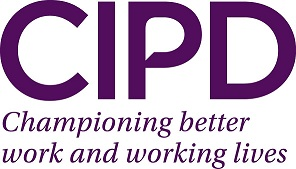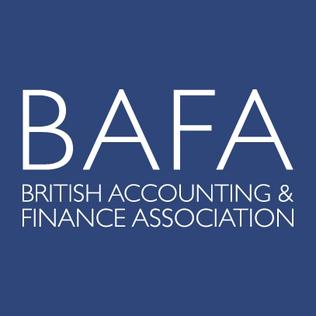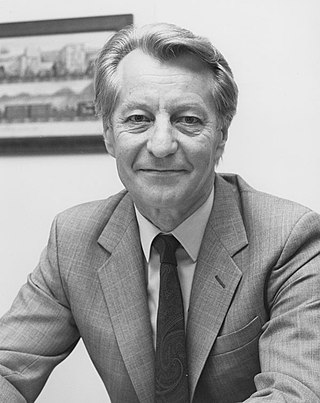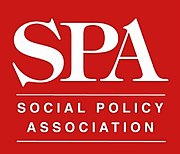Political science is the scientific study of politics. It is a social science dealing with systems of governance and power, and the analysis of political activities, political thought, political behavior, and associated constitutions and laws.
The American Statistical Association (ASA) is the main professional organization for statisticians and related professionals in the United States. It was founded in Boston, Massachusetts on November 27, 1839, and is the second-oldest continuously operating professional society in the U.S. behind the Massachusetts Medical Society, founded in 1781). ASA services statisticians, quantitative scientists, and users of statistics across many academic areas and applications. The association publishes a variety of journals and sponsors several international conferences every year.

A learned society is an organization that exists to promote an academic discipline, profession, or a group of related disciplines such as the arts and sciences. Membership may be open to all, may require possession of some qualification, or may be an honour conferred by election.

The Linguistic Society of America (LSA) is a learned society for the field of linguistics. Founded in New York City in 1924, the LSA works to promote the scientific study of language. The society publishes three scholarly journals: Language, the open access journal Semantics and Pragmatics, and the open access journal Phonological Data & Analysis. Its annual meetings, held every winter, foster discussion amongst its members through the presentation of peer-reviewed research, as well as conducting official business of the society. Since 1928, the LSA has offered training to linguists through courses held at its biennial Linguistic Institutes held in the summer. The LSA and its 3,600 members work to raise awareness of linguistic issues with the public and contribute to policy debates on issues including bilingual education and the preservation of endangered languages.

The Association for Psychological Science (APS), previously the American Psychological Society, is an international non-profit organization whose mission is to promote, protect, and advance the interests of scientifically oriented psychology in research, application, teaching, and the improvement of human welfare. APS publishes several journals, holds an annual meeting, disseminates psychological science research findings to the general public, and works with policymakers to strengthen support for scientific psychology.
The Association for Behavior Analysis International (ABAI) is a nonprofit organization dedicated to promoting behavior analysis. The organization has over 9,000 members. The group organizes conferences and publishes journals on the topic of applied behavior analysis (ABA). ABAI has issued detailed, specific position papers intended to guide practitioners of ABA. The ABAI publishes six scholarly journals including The Psychological Record and their primary organ, Perspectives on Behavior Science, formerly The Behavior Analyst. They also publish an informational journal, Education and Treatment of Children, describing practical treatment of children with behavioral problems.
The Australian Research Council (ARC) is the primary non-medical research funding agency of the Australian Government, distributing more than A$800 million in grants each year. The Council was established by the Australian Research Council Act 2001, and provides competitive research funding to academics and researchers at Australian universities. Most health and medical research in Australia is funded by the more specialised National Health and Medical Research Council (NHMRC), which operates under a separate budget.

The Royal Society Te Apārangi is a not-for-profit body in New Zealand providing funding and policy advice in the fields of sciences and the humanities. These fundings are provided on behalf of the New Zealand Ministry of Business, Innovation and Employment.

The Nautical Archaeology Society (NAS) is a charity registered in England and Wales and in Scotland and is a company limited by guarantee.

The Academia Europaea is a pan-European Academy of Humanities, Letters, Law, and Sciences. The Academia was founded in 1988 as a functioning Europe-wide Academy that encompasses all fields of scholarly inquiry. It acts as co-ordinator of European interests in national research agencies.
The Society for Applied Anthropology (SfAA) is a worldwide organization for the Applied Social Sciences, established "to promote the integration of anthropological perspectives and methods in solving human problems throughout the world; to advocate for fair and just public policy based upon sound research; to promote public recognition of anthropology as a profession; and to support the continuing professionalization of the field." Members include academic as well as practicing and applied anthropologists. The Society is unique among professional associations in membership and purpose – and in representing the interests of professionals in a wide range of settings including academia, business, law, public health, medicine, environment, and government. The unifying factor is a commitment to making an impact on the quality of life in the world. The Society publishes two journals: Human Organization and Practicing Anthropology. The SfAA was founded in 1941 and has maintained its status as an important resource for practicing and academic anthropologists alike.

The Chartered Institute of Arbitrators is a professional organisation representing the interests of alternative dispute resolution (ADR) practitioners. Founded on 1 March 1915, it was granted a royal charter by Queen Elizabeth II in 1979.
The Design History Society is an arts history organisation founded in 1977 to promote and support the study and understanding of design history. The Society undertakes a range of charitable activities intended to encourage and support research and scholarship, to offer information and create networking opportunities, to foster student participation and public recognition of the subject, and to support regional links and events. The Society welcomes members from related disciplines such as anthropology, architecture and art history, business history, the history of science and technology, craft history, cultural studies, economic and social history, design and design management studies. An elected Executive Committee and Board of Trustees works to enable the activities of the Society, and to ensure that design history is appropriately represented in higher education and research bodies in the UK.
The Materials Research Society (MRS) is a non-profit, professional organization for materials researchers, scientists and engineers. Established in 1973, MRS is a member-driven organization of approximately 13,000 materials researchers from academia, industry and government.
The Association for Computer-Aided Architectural Design Research in Asia (CAADRIA) provides a platform for CAAD-related academics and professionals to share experiences, best practices, and results in education and research in Asia and beyond.

The Chartered Institute of Personnel and Development (CIPD) is an association for human resource management professionals. Its headquarters are in Wimbledon, London, England. The organisation was founded in 1913—it is the world's oldest association in its field and has over 160,000 members internationally working across private, public and voluntary sectors. Peter Cheese was announced in June 2012 as CIPD's new CEO from July 2012.
Founded in 1936, the Society for the Psychological Study of Social Issues (SPSSI) is a group of 3,000 scientists from psychology and related fields who share a common interest in research on the psychological aspects of important social and policy issues. In various ways, SPSSI seeks to bring theory and practice into focus on human problems of the group, the community, and nations, as well as on the increasingly important problems that have no national boundaries. SPSSI affords social and behavioral scientists opportunities to apply their knowledge and insights to the critical problems of today's world. SPSSI fosters and funds research on social issues through annual awards and programs of small research grants and disseminates research findings through its scholarly journals, sponsored books, specialized conferences, and its convention programs. SPSSI encourages public education and social activism on social issues and facilitates information exchange through its newsletter, social media, and electronic discussion groups. With headquarters in Washington, DC, the Society influences public policy through its publications, congressional briefings, and the advocacy efforts of its members, fellows, and staff. The Society's mission is extended to the global arena by a team of representatives who cover developments at UN headquarters in New York and Geneva. SPSSI has been represented at the United Nations as a Non-Governmental Organization (NGO) since 1987. SPSSI serves as consultant to the UN Economic and Social Council (ECOSOC). An independent society, SPSSI is also Division 9 of the American Psychological Association (APA) and an organizational affiliate of the American Psychological Society (APS).

The British Accounting and Finance Association (BAFA) is a learned society and research organisation dedicated to the advancement of knowledge and understanding of accounting, finance and financial management. It has over 750 members and edits the British Accounting Review, an academic journal.

Robert Arthur Pinker was a British sociologist and press regulator.
David Vernon Donnison was a British academic and social scientist, who was Professor of Social Administration at the London School of Economics from 1961 to 1969, and Professor of Town and Regional Planning (1980–91) and Honorary Research Fellow at the University of Glasgow.










